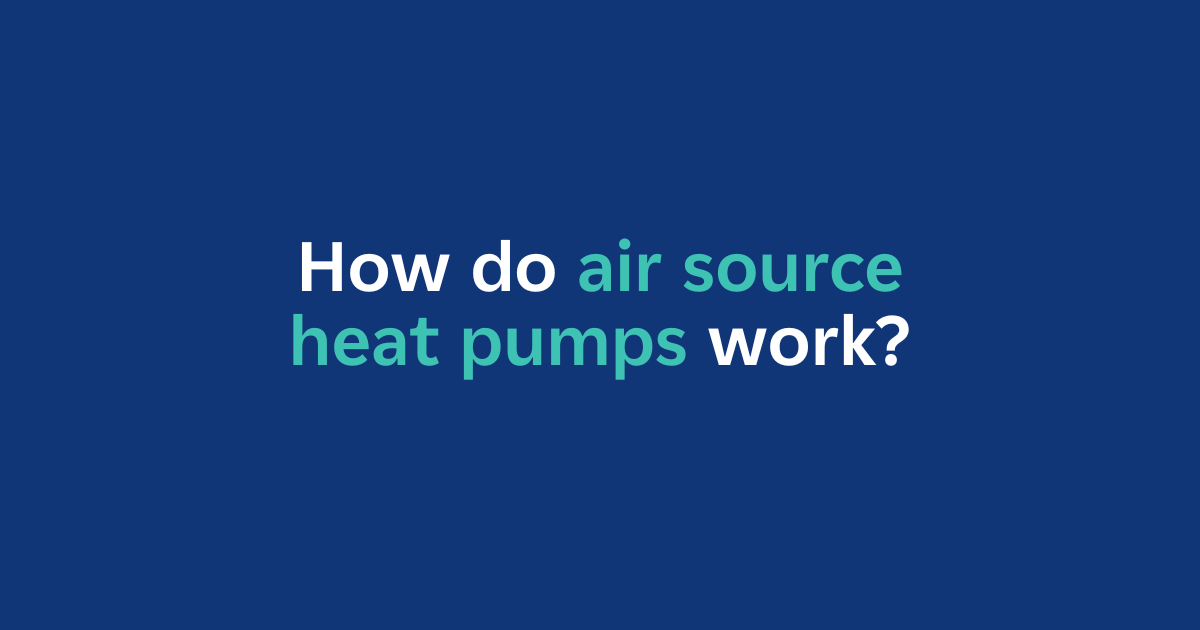How do heat pumps work?
As energy costs rise and environmental concerns grow, heat pumps are revolutionising home heating systems across the UK. These sustainable alternatives to traditional wood, gas, and oil systems offer remarkable efficiency without combustion. But how exactly do heat pumps work?
Let’s explore the fascinating world of heat pumps.
What are heat pumps and what different types are available
- What is a heat pump?
- Ground source heat pumps
- Water source heat pumps
- Air sourced heat pumps
What is a heat pump?
A heat pump transfers heat from one source location (soil, water or air) to another location, such as the radiators in your home. They use electricity and can be up to 300% more efficient than a regular boiler. This means they produce much more heat than the energy they use.
Air source heat pumps use the principles of vapour compression to generate heat. They use outdoor air to produce heat for your home. Air source heat pumps have four main parts. These parts help the refrigerant change from liquid to gas. They are: a compressor, a condenser, an expansion valve, and an evaporator.
When the refrigerant passes through the system, it absorbs the heat from the outside air. Then, the compressor increases the heat by increasing the pressure. In the condenser, this higher temperature heat is transferred to the heating and hot-water circuits of your home. After that, the medium temperature liquid goes into the expansion valve. When the pressure is released, its temperature drops. Finally, the now cooled down liquid is returned to absorb more heat from the air and repeat the process.
ASHPs can be used for heating water for domestic use, radiators, and underfloor heating. Such systems are called air-to-water heat pumps. If a lot of hot water is needed quickly, they have an electric heating element. This element can provide extra hot water, but it works less efficiently.
Alternatively, air source systems can be used for heating and cooling the indoors air using air-to-air heat pumps. These systems work like an air conditioning unit. However, they can both heat and cool your home efficiently. This adds to the benefits of air-to-air systems.
How heat pumps work
So let’s start with looking at how heat pumps in general work, as air source heat pumps are just one kind out of the few varieties.
You may already know that energy is never created or lost, but simply moved. When you heat your home with a wood burner, fireplace, or gas/oil boiler, you use the energy stored in those materials for warmth.
Put simply, a tree grows by capturing energy from the sun and absorbing carbon from its environment. That energy gets stored in the wood until it is cut down and used for firewood.
If that tree grew millions or billions of years ago, it could have turned into fossil fuels. If it fell under the right conditions, its stored energy might have become coal, crude oil, or natural gas. So these forms of heating work by releasing that stored energy through combustion.
But, as we see climate change speeding up, burning wood, coal, gas, and oil is causing real problems for our environment.
Heat pumps don’t burn anything for energy. Instead, they move energy from one place to another.
But heating your home is clearly not as simple as pulling in air from outside in the depths of winter – you’d then just have a cold house! The question, then, is where do heat pumps move energy from.
In detail
Heat pumps work differently than traditional heating systems. Instead of creating heat through burning fuel, they move energy from one place to another. This fundamental difference is why they’re so efficient.
Traditional heating works by releasing energy stored in materials like wood, coal, or gas through combustion. These materials hold captured solar energy. This energy comes from trees that grew recently or fossil fuels formed millions of years ago.
Heat pumps, by contrast, don’t create heat – they move it. This process can achieve over 400% efficiency, meaning 1kW of electricity can produce more than 4kW of heat. Here’s how the cycle works:
- A refrigerant circulates through an evaporator (similar to a car radiator)
- A fan draws air across the evaporator, transferring energy to the refrigerant
- This energy causes the refrigerant to boil and turn into vapour
- The vapour is compressed, which generates heat
- The hot vapour passes through a condenser, transferring heat to your home’s water circulation system
- The refrigerant then passes through an expansion valve, cooling it down for the cycle to begin again
Benefits of heat pumps
Heat pumps offer many benefits that make them an attractive option for home heating.
First, they are highly energy-efficient. They can provide up to 300% efficiency by transferring heat instead of creating it through burning fuel. This, along with the right energy tariff can significantly reduce energy bills.
Further savings can be made with a heat pump when paired with other energy saving measures. For example, you could also install solar panels and batteries in your home.
This efficiency also means a smaller carbon footprint. Heat pumps are a great choice for the environment because they use renewable energy sources.
How heat pumps work in cold weather
You might wonder how heat pumps extract warmth when outside temperatures drop below freezing.
The answer lies in clever engineering:
- Heat pumps use refrigerants that remain liquid well below 0°C
- Even cold air contains thermal energy that can be extracted
- The compression process significantly amplifies available heat
- As long as the refrigerant is colder than the outside air, heat will transfer naturally
The biggest thing to remember here is that no matter how cold it gets here in the UK, your heat pump will always keep you warm. With our Heat Pump Promise, the system we design for you will keep you warm whatever the weather. If it doesn’t, we’ll give you a refund.
Choosing the right heat pump
There are a number of different heat pumps available on the market.
Depending on the type of heat pump you choose, it will take energy from one of three main sources: the ground, water, or air. Each type of heat pump has distinct advantages in different situations.

Ground source heat pumps
These systems extract heat from the ground via buried pipes filled with a water-antifreeze mixture. The pipes are installed either through deep boreholes or in shallow trenches with coiled “slinky” pipes.
Advantages:
- Excellent for stable ground temperatures
- Minimal maintenance requirements
- Consistent performance
Disadvantages:
- High installation costs for drilling and excavation
- Not suitable for all terrain types
- Limited by available land space

Water source heat pumps
Instead of soil, these systems extract heat from water sources like aquifers, lakes, or rivers. They can use either closed loops (pipes) or open systems that draw water directly.
Advantages:
- More consistent temperatures than ground systems
- Less affected by seasonal changes
- Highly efficient when properly installed
Disadvantages:
- Higher installation and maintenance costs
- Limited suitable locations
- Potential environmental concerns with water extraction

Air source heat pumps
These increasingly popular systems extract heat directly from outside air. A fan draws air over an evaporator coil containing refrigerant.
Advantages:
- Significantly lower installation costs
- No excavation required
- Compatible with existing central heating systems
- Easy maintenance access
- Can run entirely on renewable energy
- 20+ year operational life
Disadvantages:
- May require more electricity during extreme weather
- Performance depends on quality of installation
- Slightly less efficient than ground/water systems in very cold weather
How heat pumps work in cold weather
You might wonder how heat pumps extract warmth when outside temperatures drop below freezing.
The answer lies in clever engineering:
- Heat pumps use refrigerants that remain liquid well below 0°C
- Even cold air contains thermal energy that can be extracted
- The compression process significantly amplifies available heat
- As long as the refrigerant is colder than the outside air, heat will transfer naturally
The biggest thing to remember here is that no matter how cold it gets here in the UK, your heat pump will always keep you warm. With our Heat Pump Promise, the system we design for you will keep you warm whatever the weather. If it doesn’t, we’ll give you a refund.
Making the switch to heat pump technology
When considering a heat pump installation, expertise matters. Choose qualified installers with experience in heat pump technology to ensure proper system sizing and efficient operation.
Air source heat pumps represent an accessible entry point for most UK homeowners looking to transition to sustainable heating. With proper installation, they provide reliable, efficient heating year-round while significantly reducing your carbon footprint.
As electricity grids continue to incorporate more renewable energy, heat pumps become an increasingly sustainable choice for environmentally conscious homeowners.



